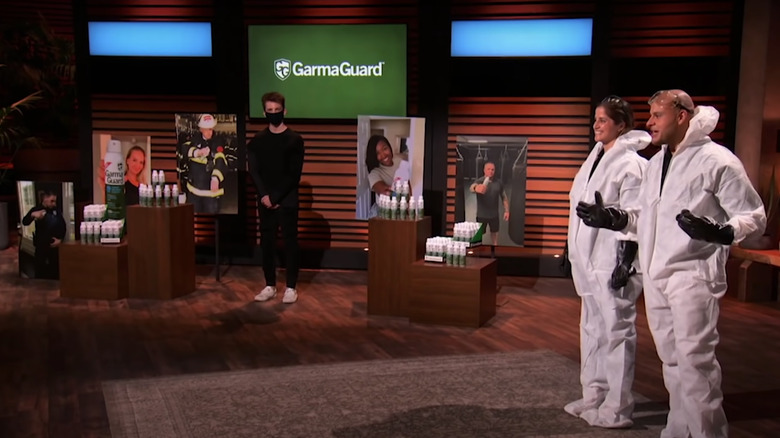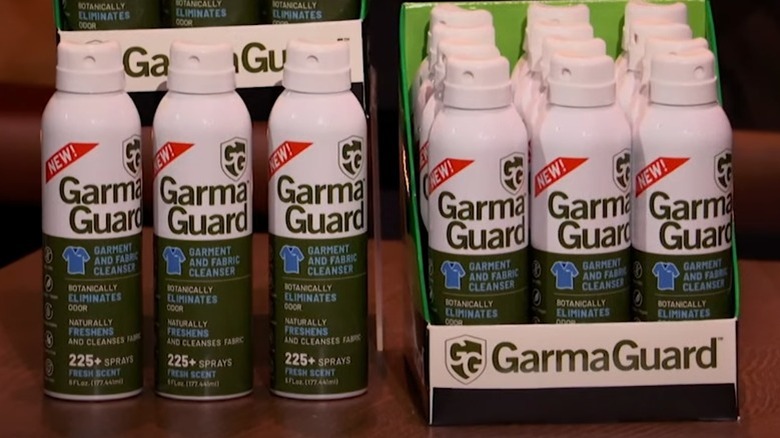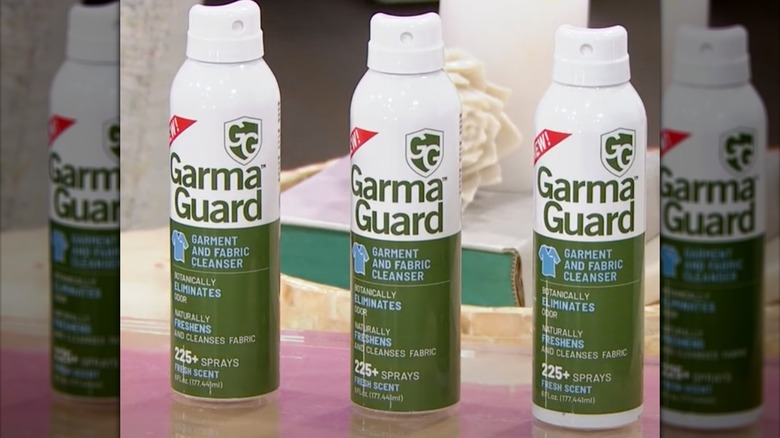Whatever Happened To GarmaGuard Garment & Fabric Cleanser After Shark Tank Season 12?
Disinfection, sanitization, and protection from germs have always been major priorities for businesses and individuals, but the COVID-19 pandemic significantly increased the public's awareness of the everyday risks of germs. According to data from Statista, since March 2020, there's been an increase in the use of just about every cleaning product, from hand sanitizer to bleach. People are routinely cleaning with disinfectant wipes, bulking up their handwashing regime, and taking special care to tackle the dirtiest spots in the house, but many are looking for an increased layer of protection when they're out and about. Pete and Bianca Badawy were looking to fill this gap in the market with their product, GarmaGuard.
Despite the timeliness of their idea and a solid pitch, the couple didn't end up receiving an investment from any of the Sharks on Season 12, Episode 1 of "Shark Tank." They did, however, leave with positive feedback from each of the investors on the show, all of whom agreed that the company would flourish with or without their investments. Discover what happened on "Shark Tank," how the company fared afterwards, and if it's still in business.
What happened to GarmaGuard on Shark Tank?
On the first episode of Season 12 of "Shark Tank," Pete and Bianca Badawy came in strong with a pitch close to their hearts. Bianca Badawy was a nurse, and Pete Badawy was a police chief — two jobs that leave you dirty and in desperate need of both a shower and clean outfit as soon as you step in the door. In many situations, however, there's no time to completely clean your clothes and kill the germs that collect on them throughout the day, so they developed GarmaGuard as a quick-fix solution.
This spray was a disinfectant that eliminated the source of the odor: bacteria. Unfortunately, however, at the time of their pitch, GarmaGuard wasn't EPA-registered, so they weren't able to display the product's disinfectant qualities on their label. Furthermore, the "Shark Tank" pitch coincided with the coronavirus pandemic, and the Badawys hadn't yet received test results that confirmed that the product worked on the virus. This caused the Sharks to step back and decline the pair's ask of $100,000 for a 10% stake in the company. However, the entire panel agreed that the product likely didn't need an additional investment to sell.
GarmaGuard after Shark Tank
After their pitch on "Shark Tank," it's likely that the creators of GarmaGuard continued business as usual. On the show, it was suggested that they become EPA-registered so they could make more specific claims about their product's ability to kill COVID-19 and eliminate germs on their bottle. It's likely that the pair worked towards this goal, but it's unclear whether they ever received those test results, as the packaging doesn't appear to have ever changed.
Despite this hangup, the company seemed to take off after their episode of the show aired. Even if you don't make a deal, many companies that appear on the show still gain publicity and customers as a result of their time on screen, and GarmaGuard was filling a desire that many people had for a product during the pandemic. The television appearance and approval from the Sharks likely helped the pair boost their product sales, secure more business deals, and usher in a new level of success.
GarmaGuard's successes
Despite not making a deal with any of the stars of "Shark Tank," the panel of investors was correct: GarmaGuard was likely to succeed either way. After their appearance on the show, Pete and Bianca Badawy appear to have struck a deal with Walmart to get their product on shelves. They also sold their garment and fabric cleaner on their website and through Amazon, and they even had a brief segment on HSN, where a three-pack of bottles was advertised for $29.99.
Additionally, the creators of GarmaGuard took a more creative approach to advertising than many up-and-coming companies. Instead of simply relying on social media or television appearances, the brand sponsored athletes like MMA fighter Jason Jackson and UFC fighters Loik Radzhabov and Herbert Burns. Choosing to sponsor athletes who participate in a particularly sweaty sport likely helped increase public trust in the product.
Is GarmaGuard still in business?
Unfortunately, although GarmaGuard's future looked promising after "Shark Tank," the company appears to have gone out of business. While Peter Badawy's LinkedIn still names himself the "Chief Executive Officer at GarmaGuard®," the website is no longer up and running, and the website domain "garmaguard.com" is available for sale (via GoDaddy). GarmaGuard is also currently unavailable on Amazon and at Walmart. Furthermore, the company's Facebook page hasn't been updated since July of 2023, while the Instagram page hasn't seen any activity since October of 2022. The most recent Instagram post was on the two year anniversary of their appearance on "Shark Tank," where the company announced a 20% off sale.
Many GarmaGuard fans have also speculated that the company is likely no longer in business. As one Instagram commenter writes, "I'm guessing it's no longer in business? Tried to buy more." The company has not put out an official statement about the closure, so it's unclear why GarmaGuard has closed their doors.


